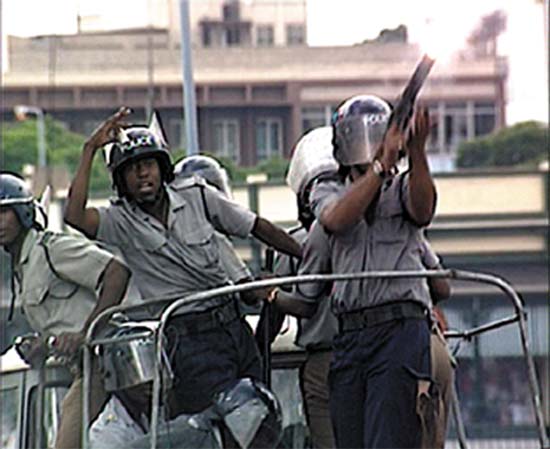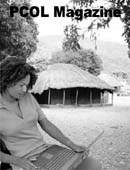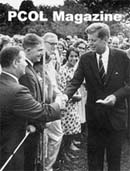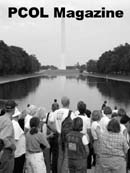
Beginning a few months before the parliamentary elections of the spring of 2000, President Robert Mugabe began recruiting destitute youth to invade white-owned farms throughout Zimbabwe. Desperate to cling to power amid increasing discontent with his kleptocratic rule, he gave his adolescent recruits full license to wreak havoc in the countryside by invading local white-owned farms. His professed intention was to allocate the confiscated properties back to the landless black majority. Little did many of the would-be recipients realize that most of these farms would be doled out to Mugabe’s relatives and ministers, as well as to himself.
An RPCV says Zimbabwe has descended into a state of unprecedented lawlessness
Zimbabwe’s Abysmal Decent
by a Returned Peace Corps Volunteer who served in Zimbabwe on 10/22/03
Zimbabwe’s government has just reiterated its vow to resist international pressure to reopen the county’s last non-government newspaper, the Daily News. Last month, the newspaper was shut down under a law that restricts freedom of press. Zimbabwe has been slipping down the drain for about four years now, but it was not always like this.
When I first arrived in Zimbabwe in October 1999 as a Peace Corps volunteer, Zimbabwe was a backpacker’s paradise. There were cheap, clean youth hostels everywhere, huge nature reserves with Lions and Hippos and friendly locals. With a relatively low crime rate and a rapidly developing tourist industry and infrastructure, the country was well on its way to becoming one of sub-Saharan Africa’s few success stories.
That was 1999. But just four years later, Zimbabwe has descended into a state of unprecedented lawlessness, plummeting GDP and severe food shortages.
Beginning a few months before the parliamentary elections of the spring of 2000, President Robert Mugabe began recruiting destitute youth to invade white-owned farms throughout Zimbabwe. Desperate to cling to power amid increasing discontent with his kleptocratic rule, he gave his adolescent recruits full license to wreak havoc in the countryside by invading local white-owned farms. His professed intention was to allocate the confiscated properties back to the landless black majority. Little did many of the would-be recipients realize that most of these farms would be doled out to Mugabe’s relatives and ministers, as well as to himself.
White farmers were threatened, severely beaten and a few of them were murdered. A white farmer outside of Harare was allegedly forced to sing songs praising President Mugabe while a war veteran held a gun to the head of the farmer’s five-year-old son.
Just before I left Peace Corps Zimbabwe in July 2000, the city of Harare had metamorphosized. The streets were now empty and devoid of tourists. Restaurants lost business and Internet cafes were empty. Child beggars, who used to subside on what they begged from tourists, became increasingly aggressive and followed me wherever I went, shouting obscenities in English when I did not give them money. There were daily gasoline shortages. Cars waited in lines several blocks long for hours to get a few drops of fuel. Trucks could not deliver food to stores. Stores went broke. People went hungry.
Standing at a bus stop one day, a tired old woman with a baby in her arms asked me for money. We began talking. “When you go back to your country”, she said, “tell them we are suffering.”
Things got worse. A friend of mine, another Peace Corps volunteer who lived near the Zambian border, was pulled off of a bus and interrogated by a group of drunken thugs who had put up a roadblock near a white-owned tobacco farm. They insisted he was the son of a local white farmer. Only when several other passengers intervened was he let go.
Violence in the rural areas increased. Mugabe’s supporters murdered a white farmer right in front of a township police station while local officers allegedly stood idly by. Months earlier I had passed by this station on my way to visit another Peace Corps volunteer and asked a very friendly police officer with a wide smile for directions. It is difficult for me to imagine this same man standing helplessly by while observing the murder of an innocent civilian. Maybe he feared for his own life, demonstrating an ineptitude that reflected the helplessness felt by the entire country.
Not only did the political violence begin to increase, but so did the overall rate of violent crime, particularly against whites and foreigners. Two friends of mine were attacked in broad daylight outside of a crowded suburban shopping center in a wealthy Harare suburb. In the same neighborhood, a man driving a pickup truck stuck his hand out the window and grabbed the wrist of a British backpacker I knew. He dragged her two blocks down a city street on her back. In front of several onlookers, the truck finally stopped as two men jumped out of the back and kicked her in the head before taking all of her belongings. She spent the next two days in the hospital and the next month with bandages wrapped around her entire upper torso. Again, the police did nothing.
Several border countries endorsed the outcome of the March 2002 elections that Mugabe won by threats and violence against the opposition and its supporters. There may be many reasons for this, such as reluctance among African leaders to criticize an elder statesman. But another more ominous possibility is that leaders of some of the surrounding states might not quite disagree with his tactics..
















